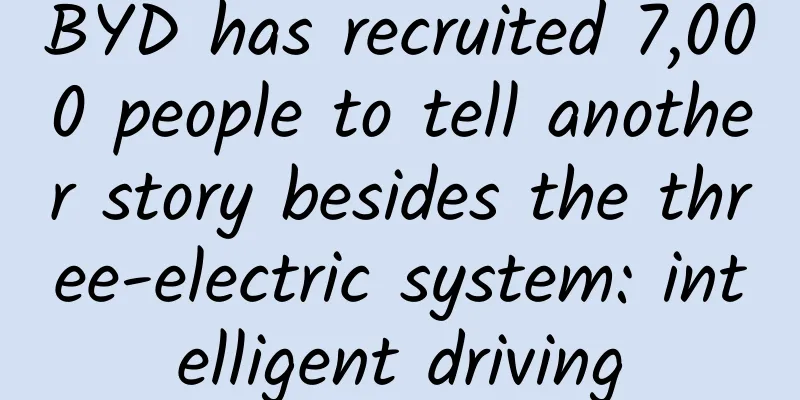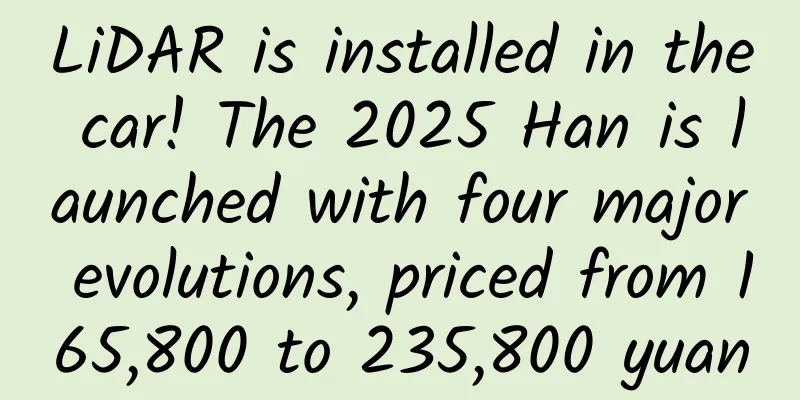BYD has recruited 7,000 people to tell another story besides the three-electric system: intelligent driving

|
Does BYD understand intelligent driving? You say it understands, right? In the past two years, it has sold more than 5 million new energy vehicles worldwide, and it seems that none of them is known for its intelligent driving. You say it doesn't understand, but it has recruited more than 7,000 intelligent driving R&D personnel and adopted the "human wave tactics", and it seems that it is determined to conquer this hill. Recently, it was reported that Zhou Peng, the former head of Baidu's cabin driving fusion intelligent driving technology, has joined BYD and is responsible for the development of end-to-end large-scale model control algorithms. From the reporting level, BYD still regards Zhou Peng as a "technical breakthrough" role, and his reporting leader also needs to report to Yang Dongsheng, the director of BYD Planning Institute. A month before Zhou Peng joined, BYD adjusted its intelligent driving R&D team. The self-developed team was separated from the Intelligent Driving R&D Center of BYD Planning Institute and became the Tianxuan Development Department, which is on the same level as the Intelligent Driving Center. Xu Lingyun is the head of this department and reports directly to Yang Dongsheng, the director of the Planning Institute. Zhou Peng will report to Xu Lingyun. This proves two things. First, BYD did not invest much in the field of intelligent driving before and did not form its own talent team, so it needed to constantly "airdrop" some technical experts to tackle the problem. Second, BYD is now very enthusiastic about intelligent driving and is recruiting talents from major companies. As early as January this year, BYD Chairman Wang Chuanfu stated that he would invest 100 billion yuan in the research and development of vehicle intelligence, a large part of which would be invested in the field of intelligent driving. When it comes to intelligent driving, BYD's approach has always been very different from that of domestic new car manufacturers. BYD Chairman Wang Chuanfu has a statement: the first half of the new energy vehicle market is electrification, and the second half is intelligence. This means that BYD's primary goal is to promote sales growth, and then it will carry out intelligent upgrades based on huge sales. This is a more rational choice. When formulating development strategies, any manufacturer needs to consider the market situation and its own development status. BYD was previously good at the three-electric system and did not invest much in intelligence. If the three-electric system and intelligence are developed at the same time, it may drag down the company's development. At the same time, Wang Chuanfu also judged that more than half of Chinese families do not have a car, and most consumers' demand for new energy vehicles is for transportation, and they pursue fuel efficiency and large space, rather than "driving with their eyes closed." Facts have proved that this judgment is in line with the pace of industry development. If nothing unexpected happens, BYD's sales in 2024 will be between 3.6 and 4 million vehicles, but the vast majority of consumers are attracted by BYD's three-electric system, not the intelligent driving system. In the past two years, China's new energy vehicle market has erupted in several waves of debates about intelligent driving. There are mainly two types of manufacturers that have stayed out of the matter. One is the joint venture manufacturers that really have nothing to offer, and the other is BYD, which is still in its dormant period. BYD's sales in 2023 exceeded 3 million units, and it retained the title of global new energy vehicle sales champion, surpassing the second place Tesla by more than 1 million units. With such a sales scale, BYD began to enter the field of intelligent driving in a big way. At BYD Dream Day on January 16, 2024, BYD officially released the "Eye of God" advanced intelligent driving assistance system. The system integrates the industry-leading Transformer+ BEV technology, which can control the vehicle at the millisecond level and has reached the domestic first-line level in technology. According to Wang Chuanfu, BYD's high-end intelligent driving system will be available as an option on models priced above 200,000 yuan, and will be standard on all models priced above 300,000 yuan. On July 16, Zhang Zhuo, general manager of BYD Auto's Ocean Network Sales Division, said that within 2-3 years, BYD's self-developed intelligent driving system will be standard on models priced around 150,000 yuan or below. This proves that BYD’s current judgment on intelligent driving seems to be no different from a few years ago. At a performance briefing in March 2023, BYD Chairman Wang Chuanfu publicly stated that the high-end intelligent driving assistance system is just a high-end component worth three to five thousand yuan. This view is very different from the mainstream perception of the industry, but no matter what, BYD's intelligent driving is basically based on this idea. BYD is now investing a lot of resources in intelligent driving, which is like filling in its shortcomings: if BYD does not have something that other competitors have, then BYD will fall behind. Therefore, after BYD has achieved industry leadership and is unlikely to have challengers in the short term, it needs to fill in its shortcomings to avoid falling too far behind in a certain field. Currently, BYD's main models such as Han, Tang, Song and Qin can be regarded as evergreens in the domestic new energy market, but the technological gap between other manufacturers and BYD is also narrowing, which is determined by the general laws of industry development. In a mature industry, the technological gap between mainstream manufacturers will become smaller and smaller. The technological gap between BMW, Mercedes-Benz and Audi is quite small, and there is no technological gap between Toyota and Volkswagen. In this case, if other manufacturers want to surpass BYD, they can only start from those areas that BYD is not very good at. Intelligent driving is the shortest plank in BYD's "bucket". If other manufacturers want to surpass BYD or replace BYD's dominant position in a certain market segment, the best breakthrough is in the direction of intelligent driving. It can be said that even if BYD has formed a research and development team of more than 7,000 people, its purpose in developing intelligent driving systems is unlikely to be to promote driverless driving, because BYD has a defensive mentality, to make up for its shortcomings and prevent others from surpassing itself. There seems to be nothing wrong with this approach at this stage, but there are also some risks. First, it may cause BYD to lose a strategic opportunity. Wang Chuanfu once described his understanding of the intelligent driving assistance system in this way: it is like a God. When it sees the driver distracted or dozing off, or about to have a car accident, it will take the initiative to improve and avoid the accident, but this "God" cannot replace the human driver. But the problem is that the current unmanned driving systems are indeed becoming more and more mature, and there is a possibility that Wang Chuanfu made a wrong judgment. Zhou Peng's former employer, Baidu, has been vigorously promoting driverless online ride-hailing services across the country through the Luobu Kuaipao platform. The platform has received more than 6 million orders so far and is growing very rapidly. If the speed of progress of the autonomous driving system exceeds Wang Chuanfu's expectations in the next few years, it will be too late for BYD to make adjustments. Wang Chuanfu's views on intelligent driving are too conservative, which may hinder BYD's path to high-end development. BYD has been the global sales champion of new energy vehicles for two consecutive years, mainly relying on the three-electric system. However, whether the three-electric system alone can gain a foothold in the high-end market remains to be seen. So far, among BYD's models, the only one with an average price of over 300,000 yuan and a good sales volume is the D9, while the D7 and N8 launched by the D8 brand have both failed to achieve good results. This seems to prove that BYD needs to tell a better "story" in the high-end market. This story currently focuses on high-level intelligent driving, but BYD is not very proficient in telling it. It is hard to say whether the joining of Zhou Peng and other technical experts will change BYD's intelligent driving development path. But one thing is certain, the development of an industry does not care about which manufacturer is "stubborn". Toyota needs to follow the situation, and so does BYD. As a winner of Toutiao's Qingyun Plan and Baijiahao's Bai+ Plan, the 2019 Baidu Digital Author of the Year, the Baijiahao's Most Popular Author in the Technology Field, the 2019 Sogou Technology and Culture Author, and the 2021 Baijiahao Quarterly Influential Creator, he has won many awards, including the 2013 Sohu Best Industry Media Person, the 2015 China New Media Entrepreneurship Competition Beijing Third Place, the 2015 Guangmang Experience Award, the 2015 China New Media Entrepreneurship Competition Finals Third Place, and the 2018 Baidu Dynamic Annual Powerful Celebrity. |
<<: Is 3D Touch being ignored by game developers just because there are too few iPhone 6s users?
>>: Just choose 16GB. You can’t add memory to the 21.5-inch 4K iMac.
Recommend
Siri's explanation of "bitch" causes controversy: suspected racial and gender discrimination
December 6th news, I believe everyone is familiar...
Tiangong Space Station: Opening a new era of Chinese "space settlement"
On December 9, 2021, Wang Yaping (left) and Ye Gu...
Bidding account hosting outsourcing, how can enterprises do bidding well and avoid detours?
How to choose a bidding hosting company? If the c...
How to conduct refined operations based on the user life cycle?
According to the user life cycle, users can be di...
How to optimize SEO specifically? What are some ways for individuals to optimize their websites?
Many people think that SEO is actually very simpl...
The most undesirable bug in Android: fix is nowhere in sight
Android 5.1 has been pushed to many Nexus devices...
The first wave of Spring Festival advertisements are now online. Do you want to go home after watching them?
The end of the year is approaching, and during th...
Where is the "irreplaceability" and "core competitiveness" of an operation?
Where do you think the "irreplaceability&quo...
Secret War of Information Flow: In-depth Analysis of the Trading Model that Earns 10 Million Yuan Annually!
In the information flow industry, there are too m...
CEO live streaming is not for selling goods!
More than 30 years ago, when Microsoft was promot...
What happened on the day the dinosaurs went extinct? Silicate dust may tell you
Science Times reporter Wu Tong A climate research...
I swear! I swear! I swear!
He is taciturn After saving people from the mud F...
Chinese native dog, you are not even a breed!
What! The “Chinese native dog” is not a breed of ...
Home appliance companies are "in love" with the post-90s generation. The spring of Tongshuai fashion home appliances has come.
As time goes by, the post-90s generation has grad...









